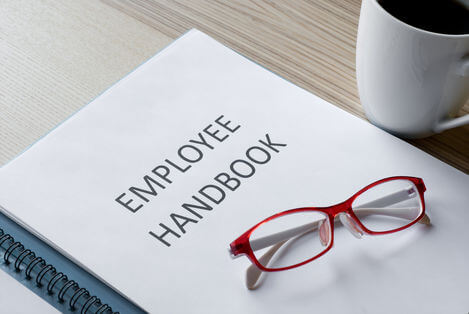5 Mistakes to Avoid In Employee Handbooks

01. It's too long, inconsistent, or redundant.
Like with your house, when you live with an employee handbook for a while, you collect things and it gets cluttered. Your handbook gets longer and runs the risk of having internal inconsistencies. Once or twice a year, it’s a good idea to give it a thorough review to remove inconsistent or redundant policies, plus make it shorter and more readable. If you want people to follow the rules, it’s important to have them be clear and accessible.
02. It reads more like an operations manual.
An overly-detailed handbook becomes too much of a procedures manual. For example, it’s important to state that complaints of harassment will be responded to with a prompt and thorough investigation. But the policy should avoid giving too much detail, such as the number of days to expect each step of the investigation to take, so that the employer has flexibility with addressing
03. It sounds too overbearing or paternalistic.
Some handbooks include policies that sound more intrusive than they really are. Carefully tailored language can help avoid a perception of the employer being overbearing. For example, a financial services company had a policy that required employees to handle their finances in a responsible manner. However, the policy was truly only concerned with financial accounts they had through the employer and required further explanation to make it clear the employer wasn’t concerned with what the employees were doing personally
04. It's missing information that affects enforcement.
Another mistake is including language that, while acceptable, isn’t the best training tool for supervisors because it omits certain nuances. For example, an attendance policy may state a specific number of absences that are unacceptable during a certain timeframe. If the policy fails to state that absences covered by FMLA or local sick leave rules don’t count against employees, you can end up having a well-meaning supervisor discipline an employee for absences that should have been allowed.
05. It's lacks clear direction on where employees can go for help.
Employers often miss an opportunity to specify who their “first responders” are. These are the company representatives who will receive reports of anything from alleged misconduct to medical leave. Employers should select these people appropriately and train them about their role. The handbook will have a longer shelf life if you mention the reporting person by title and not name. Be sure the titles used match the titles that actually exist in your organization.
Handbooks are just one of many resources available via Congruity's team of professionals. Contact us today to learn how your company can mitigate risks in the workplace by engaging a PEO at: 844.247.4100.


